Arts & Entertainment
The predictable predictability of the Oscars
Favoring middle-of-the-road prestige over edgier fare
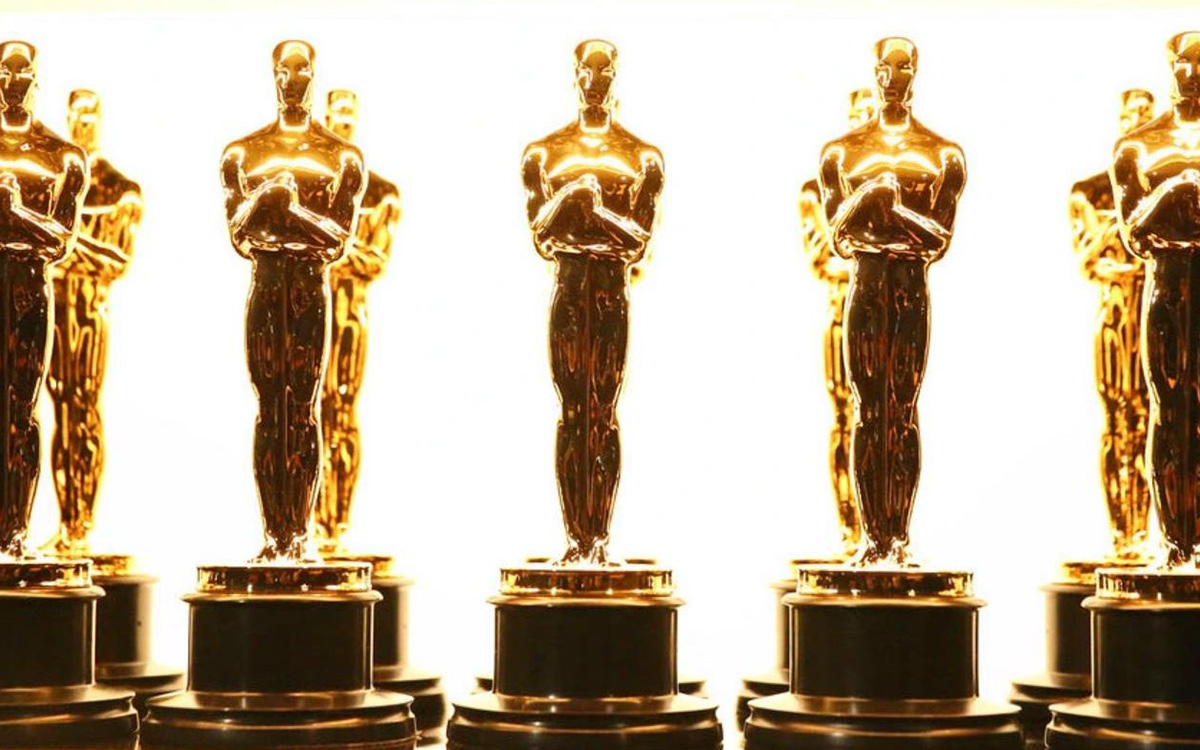
It’s hard to write a reaction piece about the Oscars when you recognize that the Oscars, by their very nature, are essentially a poll – or perhaps, more aptly, a popularity contest – which reflects an aggregate of personal opinions, and therefore have as much to do with internal Hollywood politics as with rewarding artistic excellence.
I’m not saying that the movies and people being celebrated on the stage at the Dolby Theater in Hollywood Sunday night – all of them, winners and nominees alike – didn’t deserve to be there; on the contrary, 2023 was an outstanding year for cinema, and every one of the contenders could be considered worthy of taking the prize. If that’s the case, however, how can any of these outcomes be determined without the influence of personal taste? Making movies is not like playing sports, where a win results from the highest number of points scored and goals blocked; there is no such handily objective criteria to rely on in picking an actor, a screenwriter, or an entire film to proclaim as the “best” in its respective category, and it’s inevitable that Academy voters will be influenced by personal bias when they make their choices on that final ballot.
While Sunday’s 96th annual Oscar ceremony, which offered the usual snubs and oversights and no real surprises, might have disappointed me or even occasionally sparked a glimmer of outrage, I cannot fairly say that any of the final results were “mistakes.” And though it may be oversimplifying things to say that being offended by the Academy’s final choices is akin to being angry that someone else’s favorite flavor of ice cream is chocolate when yours is salted caramel praline, it’s still enough to convince me that my “reaction” piece to the Academy Awards can really only ever be an “opinion” piece,
With that in mind, here we go.
The presentation itself was the usual blend of witty repartee (mostly provided with success by veteran Oscar host Jimmy Kimmel, though attempts at it from the various presenters ran the gamut from delightful to disastrous), musical performances (Billie Eilish and brother Finneas O’Connell’s rendition of “What Was I Made For?”, which went on to win the evening’s only award for “Barbie”, was a particular highlight, alongside the more lavish and deliciously amusing dance production number headed by Supporting Actor nominee Ryan Gosling for “I’m Just Ken” from the same film), uplifting moments (a regal Rita Moreno’s benedictory introduction of “Barbie” Supporting Actress nominee America Ferrera brought tears to my eyes, and I suspect I wasn’t alone), and show-stopping surprises (John Cena’s teasingly faux nudity presenting the Best Costume Design award was a memorable stunt, to put it mildly, as was the combination of Arnold Schwarzenegger and Danny DeVito to do the honors in the Visual Effects and Film Editing categories) – yet it also had more than its fair share of embarrassing gaffes, such as upstaging the “In Memoriam” segment with an overblown production number accompanied by father-and-son operatic crooners Andrea and Matteo Bocelli’s duet of “Con tu partirò”, a move that has fueled perhaps more post-Oscars outrage than anything else from this year’s ceremony.
As for the politics, there were the expected barbs making fun of easy conservative targets, but most of the speeches avoided invoking too much progressive fury. The one overtly political moment came with the win of UK director Jonathan Glazer’s “The Zone of Interest” for Best International Feature, when he read, in prayerlike monotone, a pre-prepared statement warning against the dehumanizing hate depicted in his slice-of-Nazi-life historical drama and calling for empathy for the targets of such hate on both sides of the current crisis in Gaza. It was met with backlash, of course, especially after a partial quote in Variety omitted key elements of the speech and led many to believe the Jewish filmmaker was refuting his own religion.
As for the winners of the awards themselves (you can find the full list on the Oscar website) the evening’s choices fell more or less in line with my predictions – though not necessarily my preferences.
The domination of “Oppenheimer” in most of the major categories in which it competed was, for anyone following the pre-ceremony buzz, a foregone conclusion. Few doubted that Cillian Murphy would handily claim the Best Actor prize – thwarting nominee Colman Domingo (“Rustin”) from becoming the first queer actor to win for playing a queer character in the process – or that Christopher Nolan would take the Best Director category, and from there the win for Best Picture felt as inevitable as anything can be at the Oscars.
Equally inevitable was the evening’s most easily predicted “Oppenheimer” win, as veteran Hollywood player Robert Downey, Jr. ebulliently swaggered onstage amid the enthusiastic familial cheers of his peers to claim the Best Supporting Actor prize; his acceptance speech, in which he self-deprecatingly recalled the legal and professional obstacles arising from the substance abuse that nearly derailed his early career, became a testament to overcoming personal setbacks to achieve an even higher success, something that resonated in the words of several other of the evening’s winners.
In the categories where “Oppenheimer” didn’t win, the odds were already in favor of the eventual victors, such as first-time filmmaker Cord Jefferson, whose “American Fiction” earned him the Best Adapted Screenplay Award over fellow front runners like “Barbie” and “Poor Things,” and Da’Vine Joy Randolph, whose winning Supporting Actress turn in “The Holdovers” had been a juggernaut throughout the award season.
Many Oscar fans, though most accepted the predestination of “Oppenheimer” as the year’s big winner, might rather have seen a different candidate come out on top (my own choice, for what it’s worth, would have been “Barbie,” with “Poor Things” and “Zone of Interest” coming up close behind); but even if Nolan’s weighty and technically dazzling biopic was unquestionably a fine film, exploring a deeply disturbing slice of not-too-distant history that still casts a long existential shadow over our world today, it’s impossible for me not to see in its multiple wins an all-too-familiar pattern of “safe” choices.
While “Oppenheimer” might pique ethical discussions over its title character’s choice to build the atomic bomb, few would find controversy in the idea that the destruction unleashed on the world by that choice is a reason for concern. Its most viable competitors, “Barbie” and “Poor Things” – both of which touched on many of the same existential themes, albeit from a markedly different direction and in a more absurdist style – each stirred divisive opinions around (among other things) a perceived feminist agenda; other highly-acclaimed titles in the running, like the non-English language entries “Zone”, “Past Lives”, and “Anatomy of a Fall”, fell outside the comfortable domestic audience mainstream where Oscar’s favorite picks are usually a little too deeply-rooted to allow much opportunity for a dark horse upset. While not many expected Bradley Cooper’s ambitious Bernstein biopic “Maestro” to take home any awards, it was considerably more noteworthy that Martin Scorsese’s “Killers of the Flower Moon,” nominated for 10 Awards and widely lauded as one of the year’s most essential films, failed to score a single one of them – though I can’t help also noting that it deals with one of most shameful threads in our American past, inevitably making it a controversial movie for an era marked by deeply divided ideologies around that subject.
It’s perhaps for that reason that “Flower Moon” was not considered a front runner in most of its categories, but there was one in which it was seen as a heavy favorite. With Lily Gladstone poised to become the first Indigenous performer to win the Best Actress trophy, the odds leading up to Sunday’s presentation seemed to position them as the front runner; in the end, however, it was Emma Stone’s tour-de-force in “Poor Things” – in which she appeared in virtually every scene, in contrast to Gladstone’s relatively limited screen – that took it instead. Though it wasn’t quite a surprise, given the number of wins Stone has garnered already for the film, which also took home the prizes for Best Makeup and Hairstyling and Best Production Design, it nevertheless felt – to me, at least – like another example of Oscar’s predictable reluctance to court controversy with its choices.
Ironically, but not surprisingly, this conservative approach often just ends up causing a controversy of its own, and this case is no exception. Though I had championed Stone’s brilliant performance as the obvious winner, when her name was announced I found myself feeling disappointment over Goldstone’s loss, even as I was thrilled for Stone’s well-earned victory. After all, in a contest where the outcome is entirely subjective, Academy voters could have chosen to amplify the excellence of someone from within a marginalized community. Stone, who seemed as surprised at her win as anyone else, did remarkable work, but so did Gladstone; though it truly is “an honor just to be nominated,” it was an opportunity for Oscar to take a step toward correcting a long-ignored injustice at a time when doing so could make a demonstrably constructive impact on our culture and our society at a time when doing so would have a tremendous cultural impact, and it didn’t happen. It was a moment that struck me with an odd sense of disappointment even as I cheered for Stone; a bit of the sour within the sweet.
That, aside from a sense of missed opportunity over the evening’s consistent pattern of favoring the middle-of-the-road prestige represented by “Oppenheimer” over the edgier, more confrontational material presented by some of the other titles on the slate, was my biggest takeaway from the Academy Awards. Though I can’t say that any of the winners were unworthy, I can’t help thinking that their victories were somewhat tainted by the virtual shutout of “Barbie”, (which still feels to me like a message for female filmmakers to “stay in their lane”) and relatively low showing for “Poor Things” (which took only 3 of the 11 awards for which it was nominated), and that their underappreciation for such films was for me proof that many of the professionals working within the industry are afraid of material that pushes the medium too far outside its traditional boundaries, that dares to imagine stories and ideas which give voice to “outsider” concerns beyond the level of lip service, or that stretches the accepted limits of narrative entertainment.
More concerning, perhaps, is the minimal change that has come in the wake of the Academy’s much-publicized retooling to promote greater diversity and inclusion among the nominees. While it’s heartening to see people of color and queer people being brought into the mix more consistently than ever before, it’s also all the more painful when we see them passed over or relegated to the status of “also ran” most of the time. As a queer writer working for a queer publication, it’s impossible for me not to be impatient when films with strong LGBTQ content are lauded alongside mainstream titles only to consistently be passed over when it comes to the final victory. While queer subject matter, in varying degrees, was part of movies like “Rustin”, “Nyad”, and even “Barbie,” only two wins in the “major” categories went to films that included significant queer themes – “American Fiction” and “Anatomy of a Fall”, both of which won for their screenplays.
And while it’s now old news, the Academy’s complete omission of Andrew Haigh’s melancholy gay ghost story “All of Us Strangers,” a queer UK film overwhelmingly embraced by other major awards bodies across the world and in America itself and considered a major contender before failing to earn a single Oscar nomination, and female filmmaker Emerald Fennell’s “Saltburn,” which hinged – at least ostensibly – on a queer attraction between stars Barry Keoghan and Jacob Elordi, speaks volumes about the comfort level surrounding queer content within mainstream Hollywood. Even “May December,” a high-profile film directed by queer indie pioneer Todd Haynes but featuring only presumably heterosexual characters, received only a single nod (for Best Original Screenplay) for “May December,” despite being widely considered a front-runner for several acting awards. While inclusivity doesn’t mean considering every queer-relevant movie a shoo-in for the competition, it’s telling when the Academy all but ignores queer titles that have been contenders and even winners at all the other major film award ceremonies, and frankly, it’s extremely annoying. While I can’t speak for women, those in the Black community, or other groups with a history of being dismissed by Oscar, I can only assume that their sentiments must resemble my own.
Yet as I reach the end of my observations about the latest installment of the Academy Awards, I find myself falling short of blaming the Academy itself, at least as an organization. While it has had a problematic history of dragging its feet when it comes to evolving toward a more all-embracing approach to bestowing honors, undeniable progress has been made. That this progress is infuriatingly slow is less a reflection on the awards than it is on Hollywood as a whole; after all, despite Academy efforts to ensure greater diversity among its nominees, it’s the individual choices of its voters that determines the final results – and if those results fail to accomplish more than the occasional token victory for the non-white-heterosexual contenders, it’s a symptom of the fact that those voices are underrepresented within the industry at large.
If we want to see an Academy Awards ceremony that truly accomplishes the kind of all-inclusive spirit for which it has so palpable a potential, we must continue to pressure the Hollywood industry at large to build a more diverse and inclusive creative environment. Otherwise, no matter how much they promise to do better, they will always fall short.
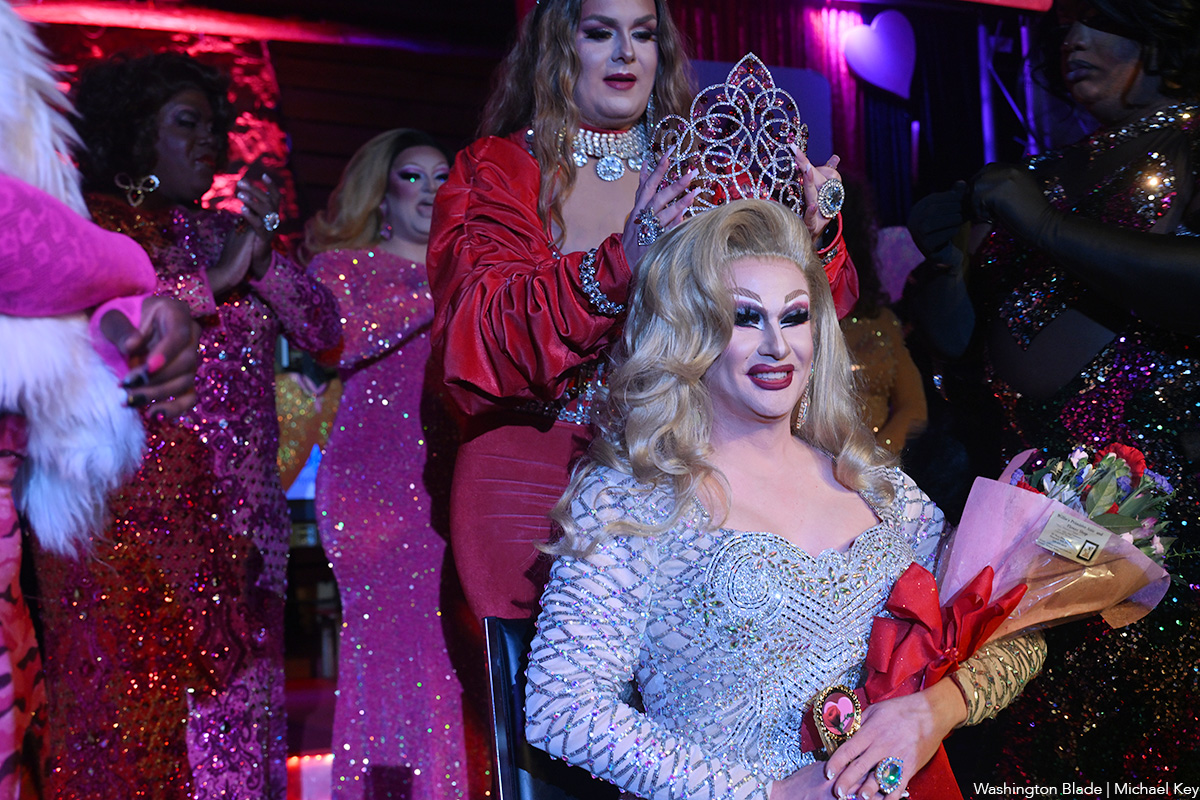
The 44th annual Queen of Hearts pageant was held at The Lodge in Boonsboro, Md. on Friday, Feb. 20. Six contestants vied for the title and Bev was crowned the winner.
(Washington Blade photos by Michael Key)
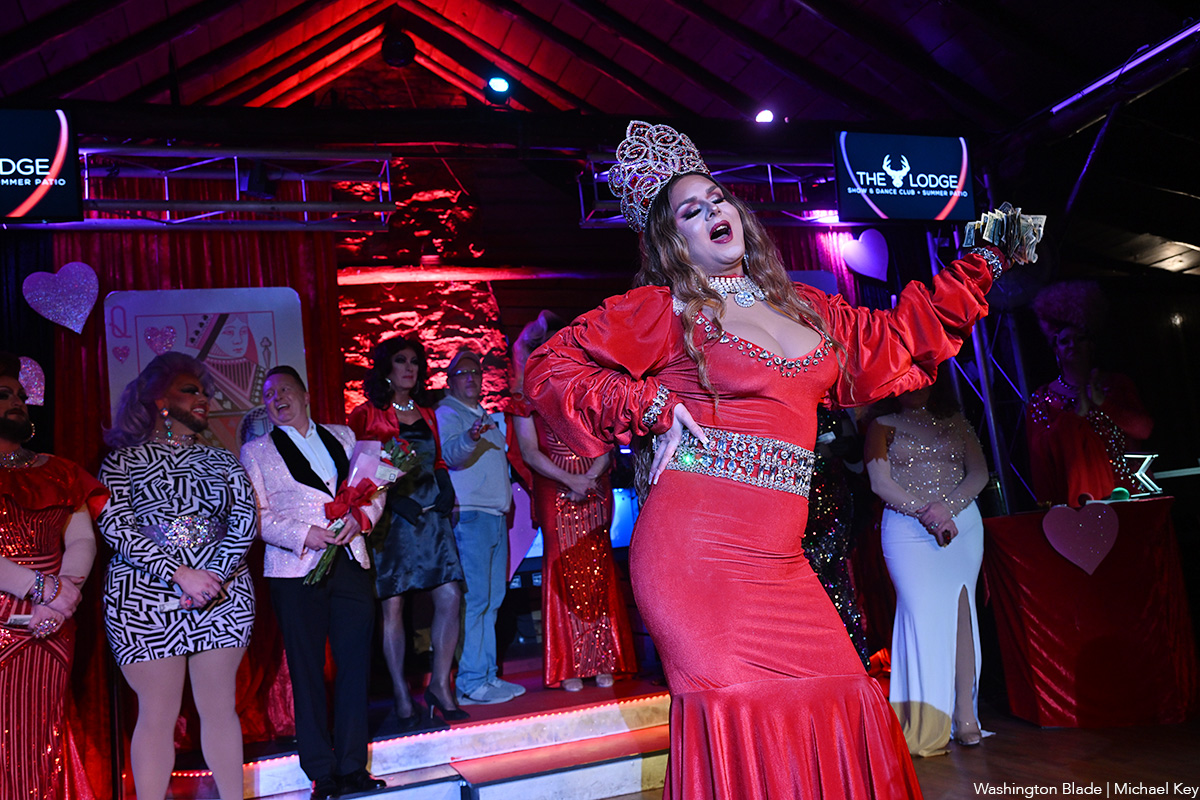
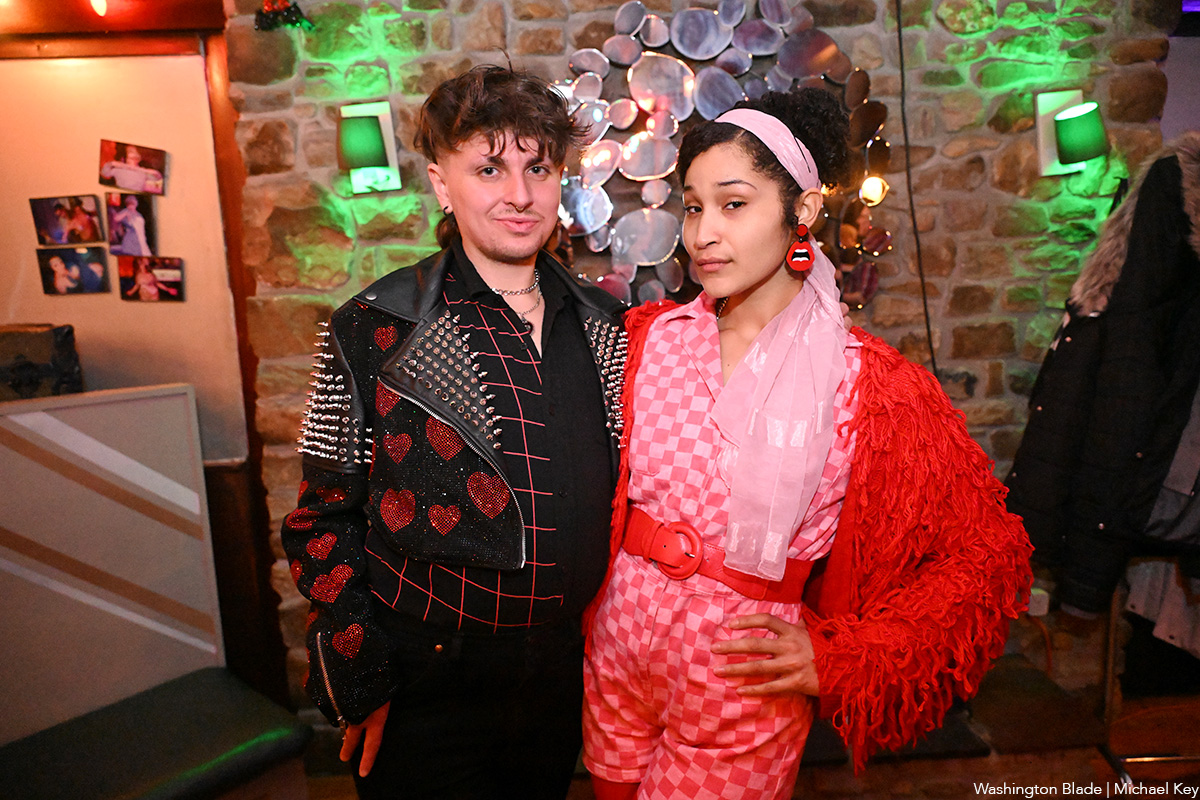
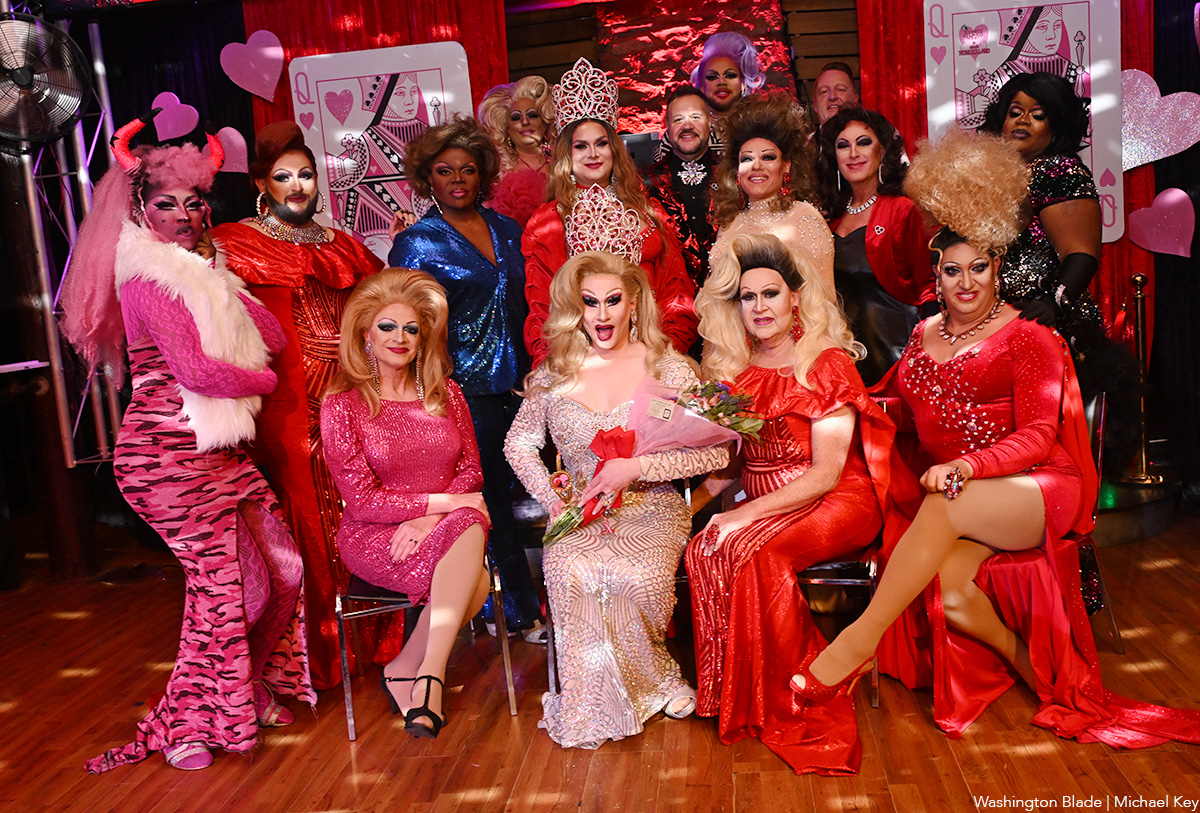
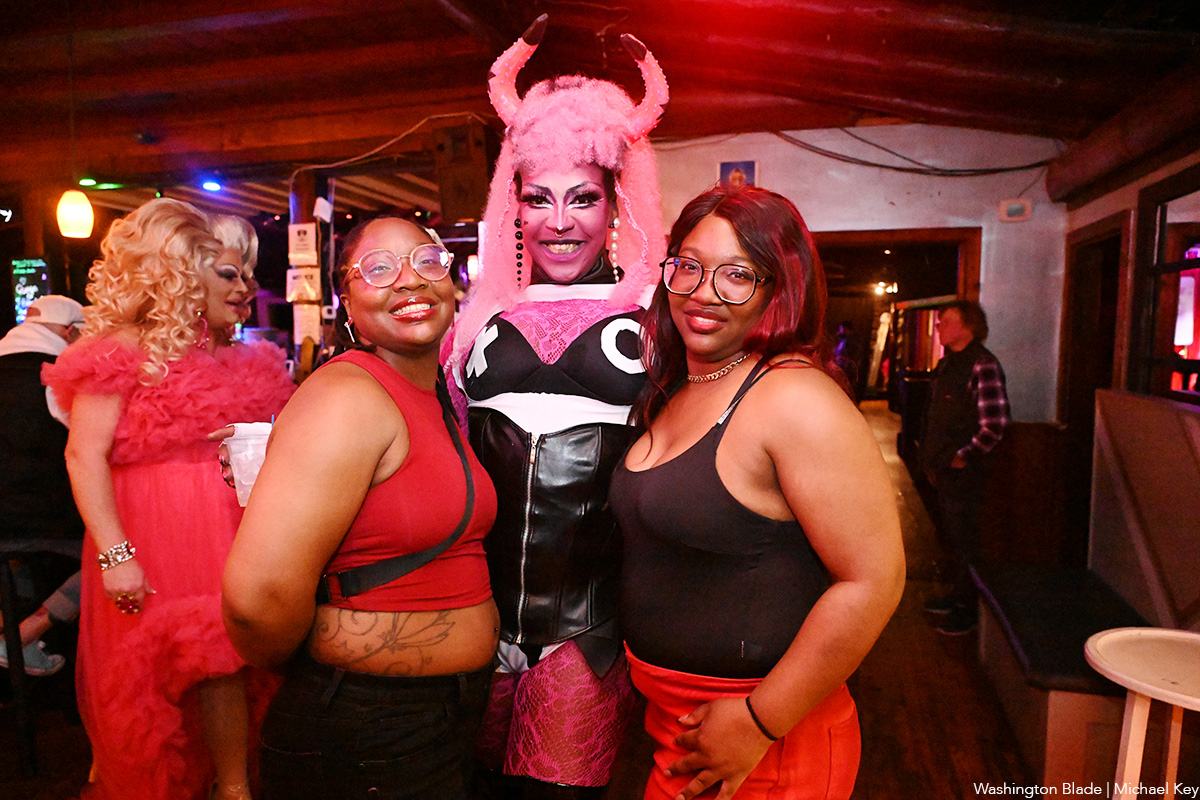
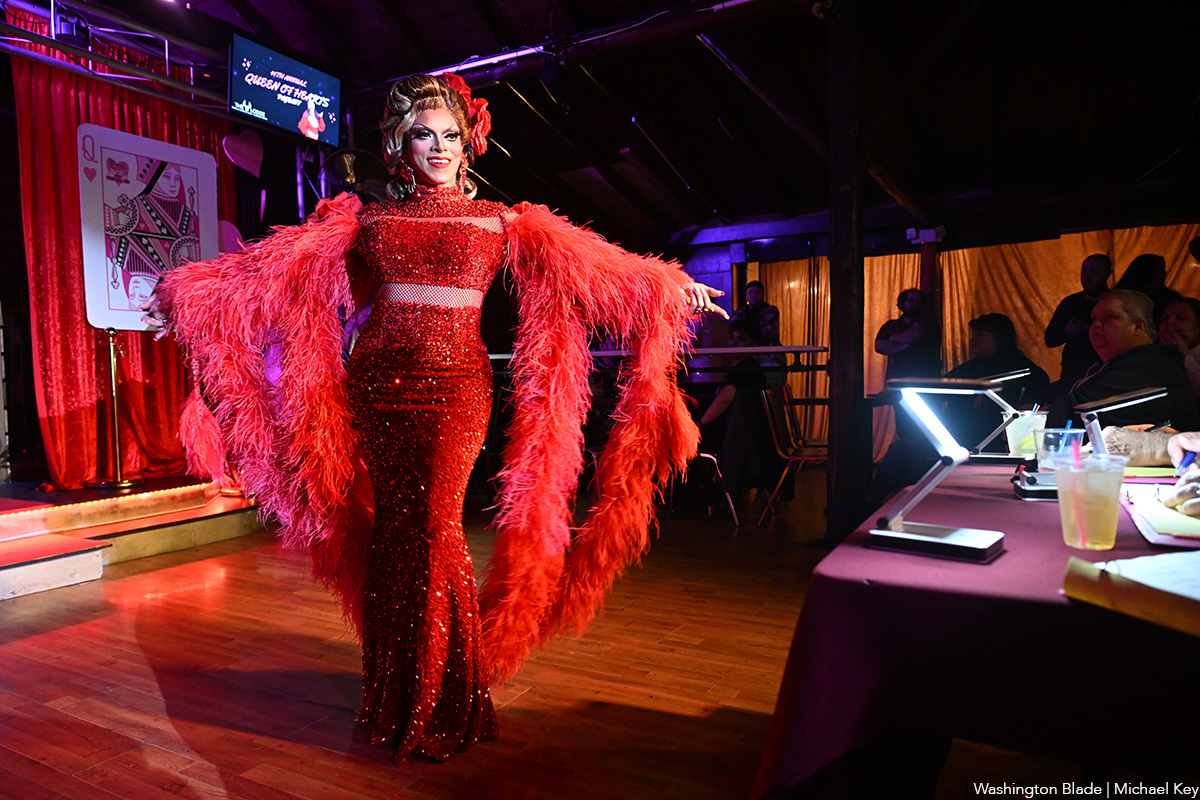
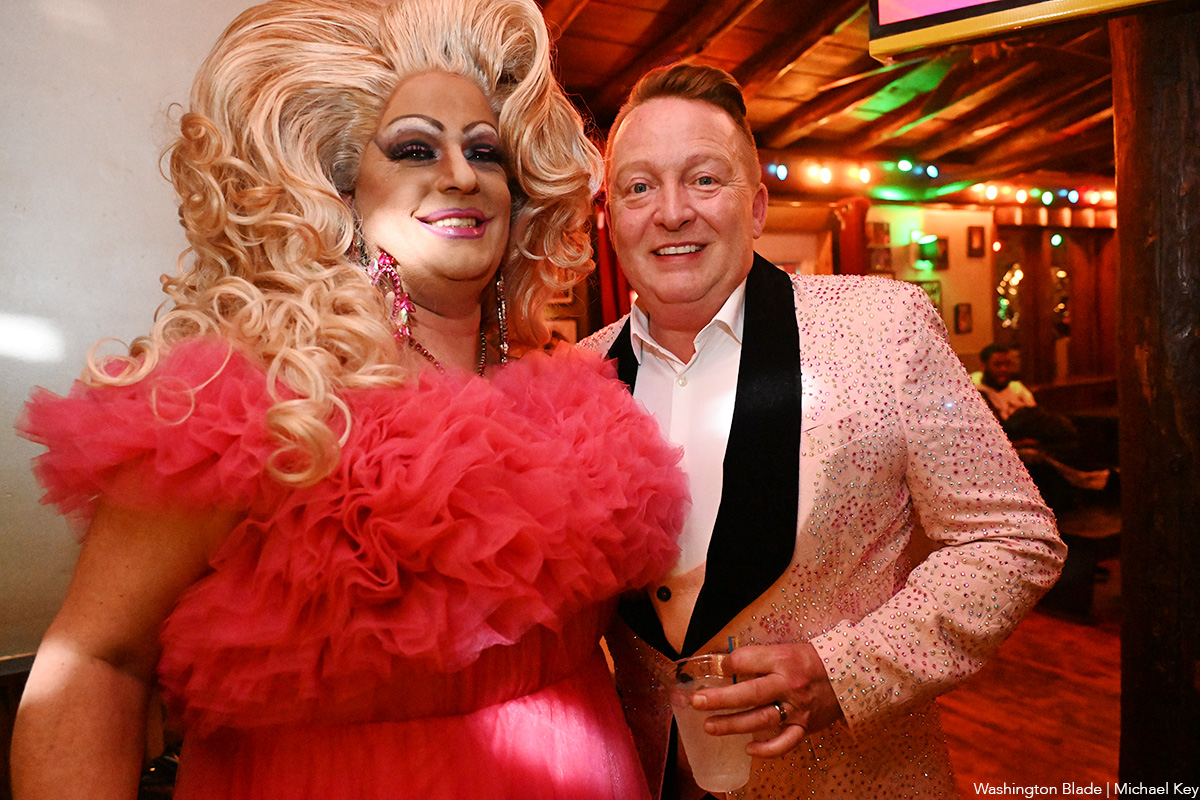
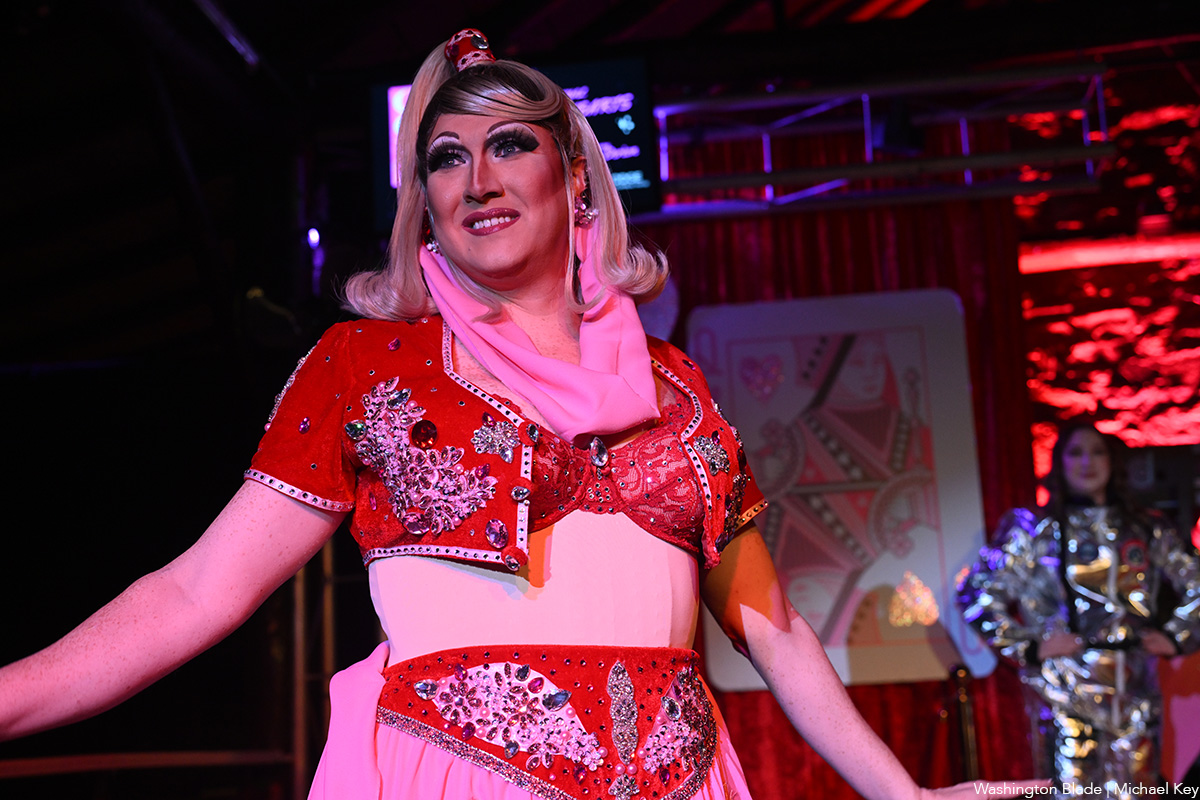
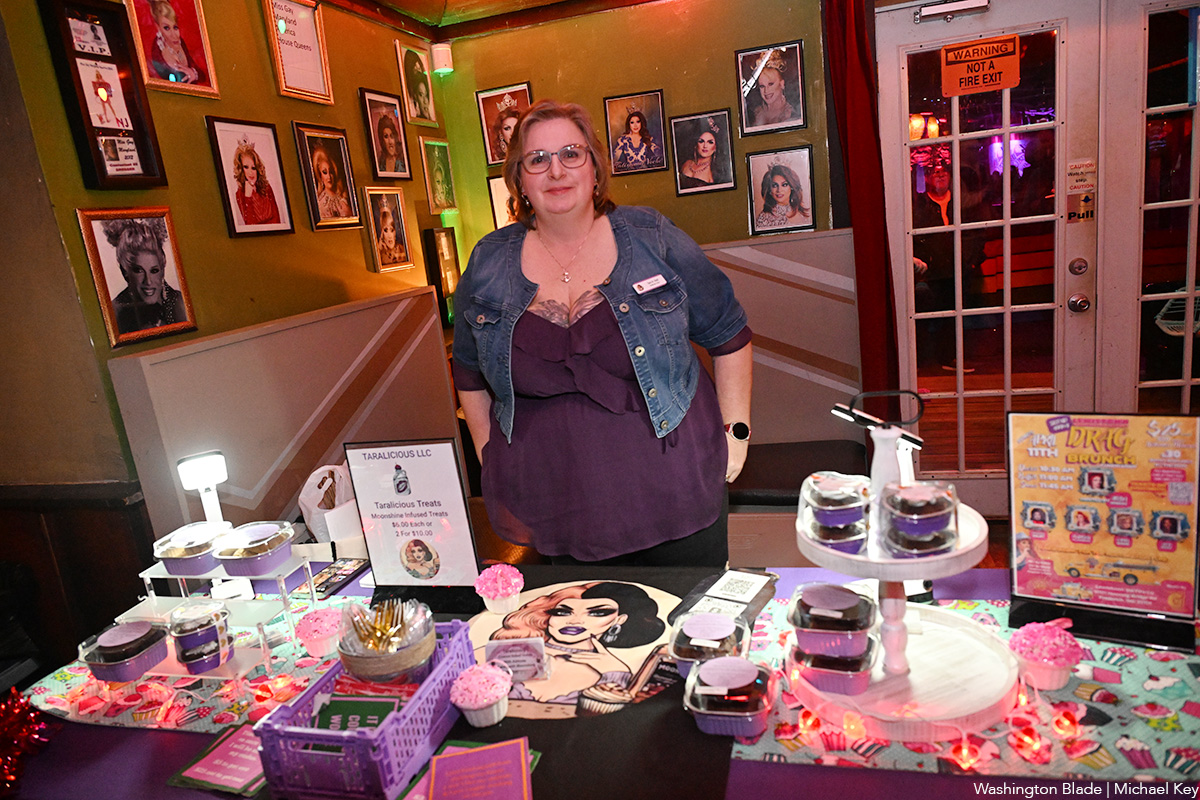
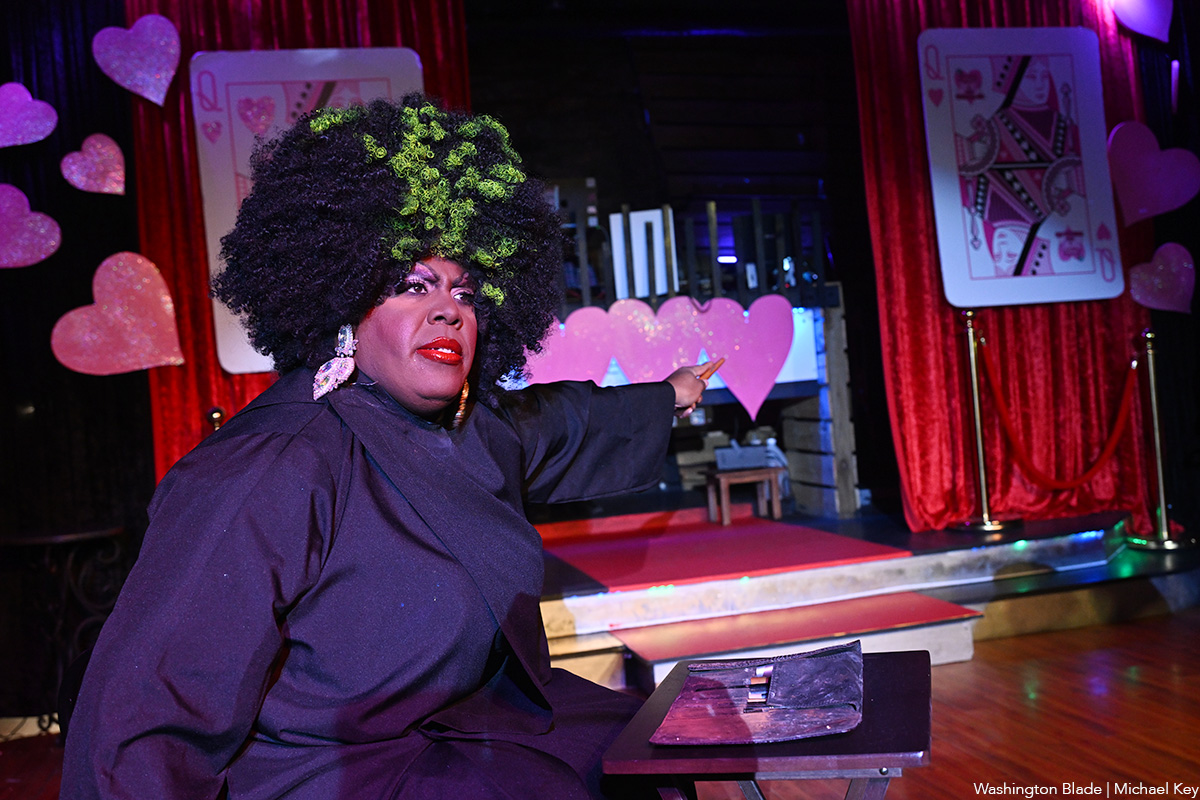
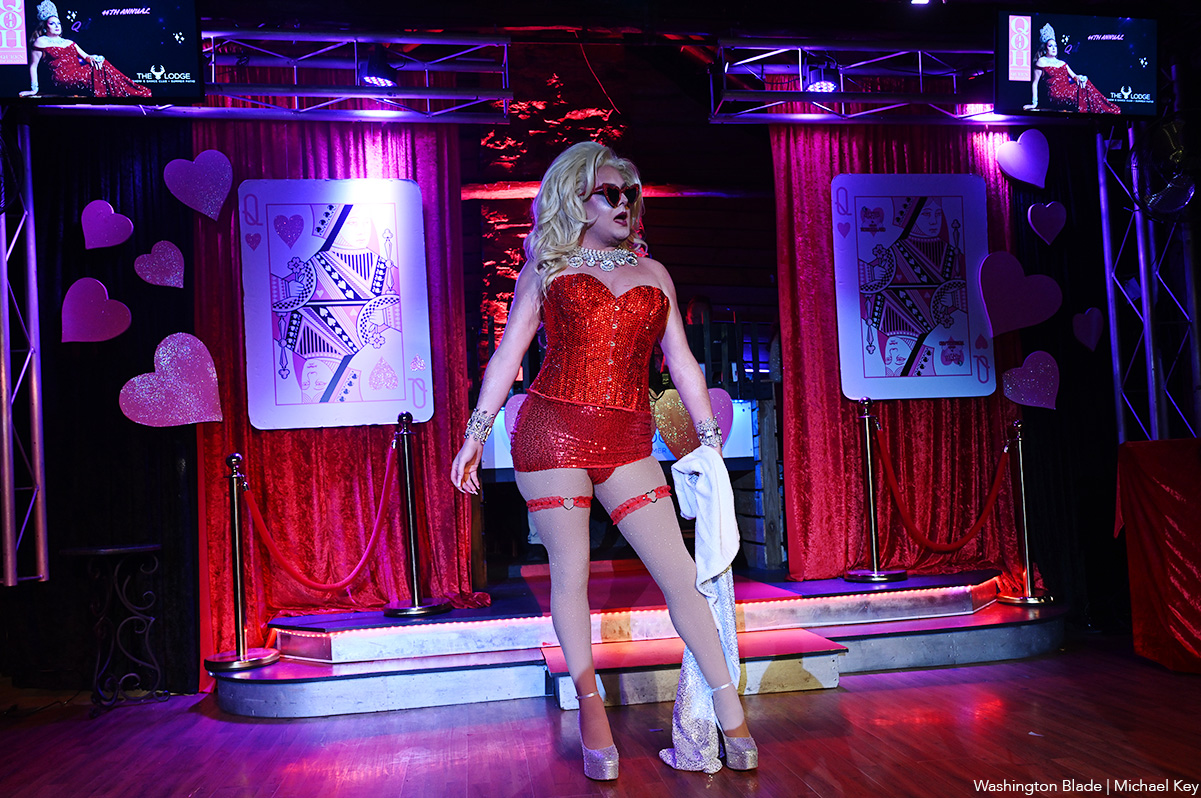
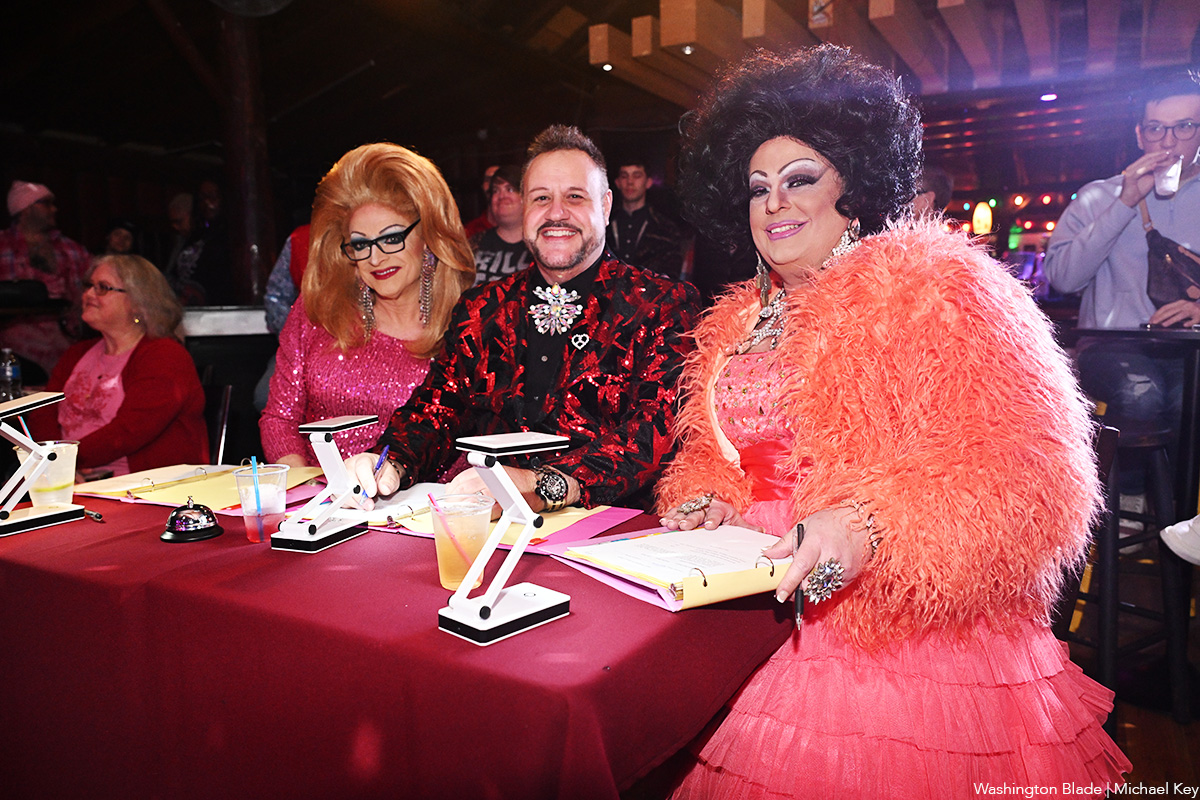
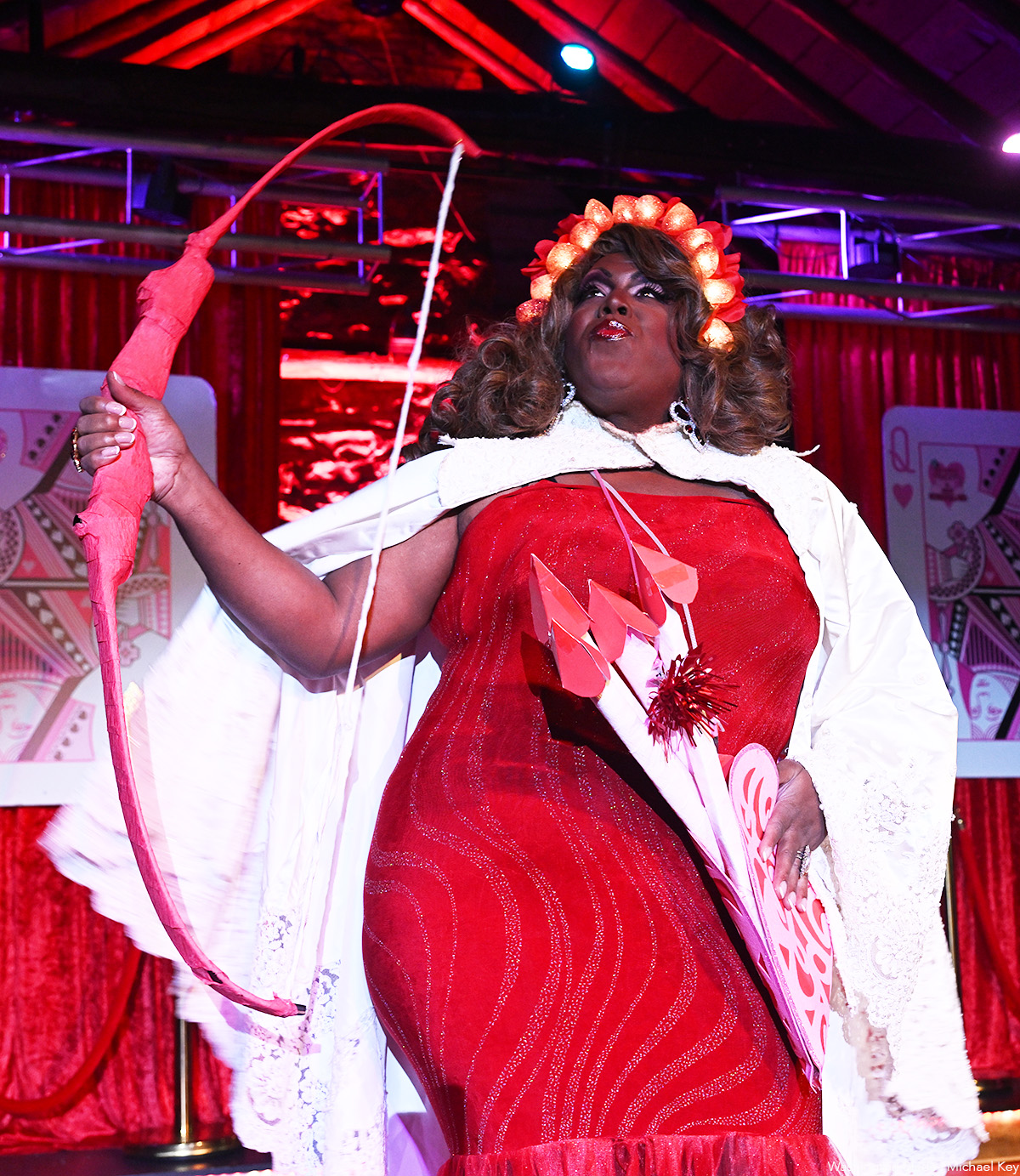
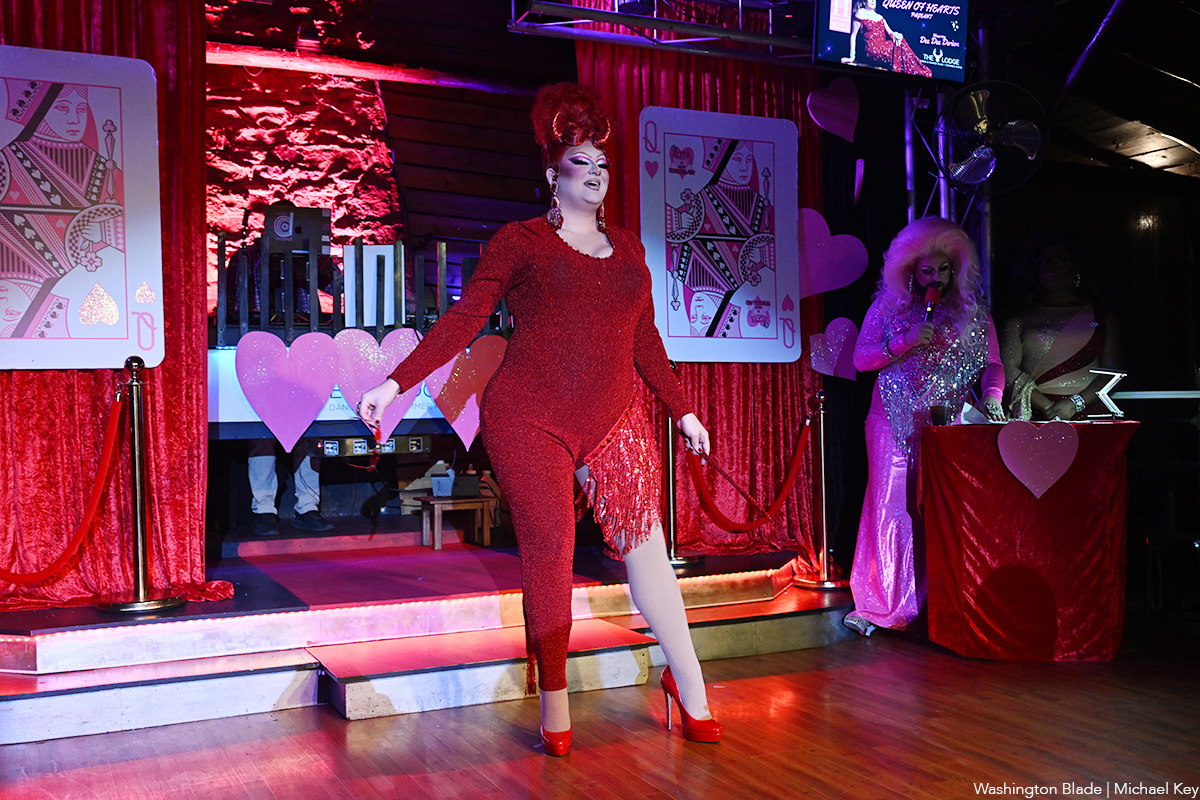
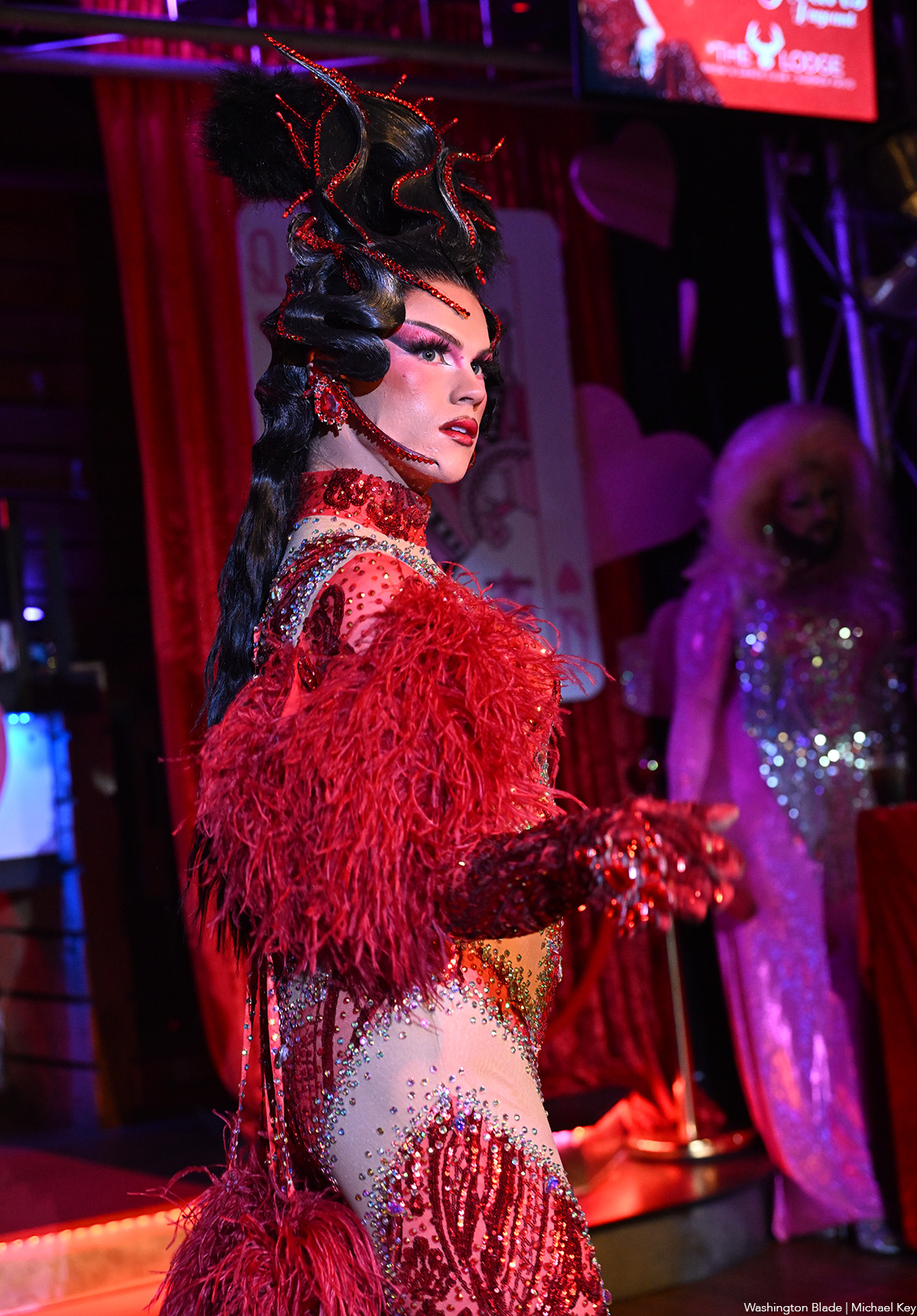

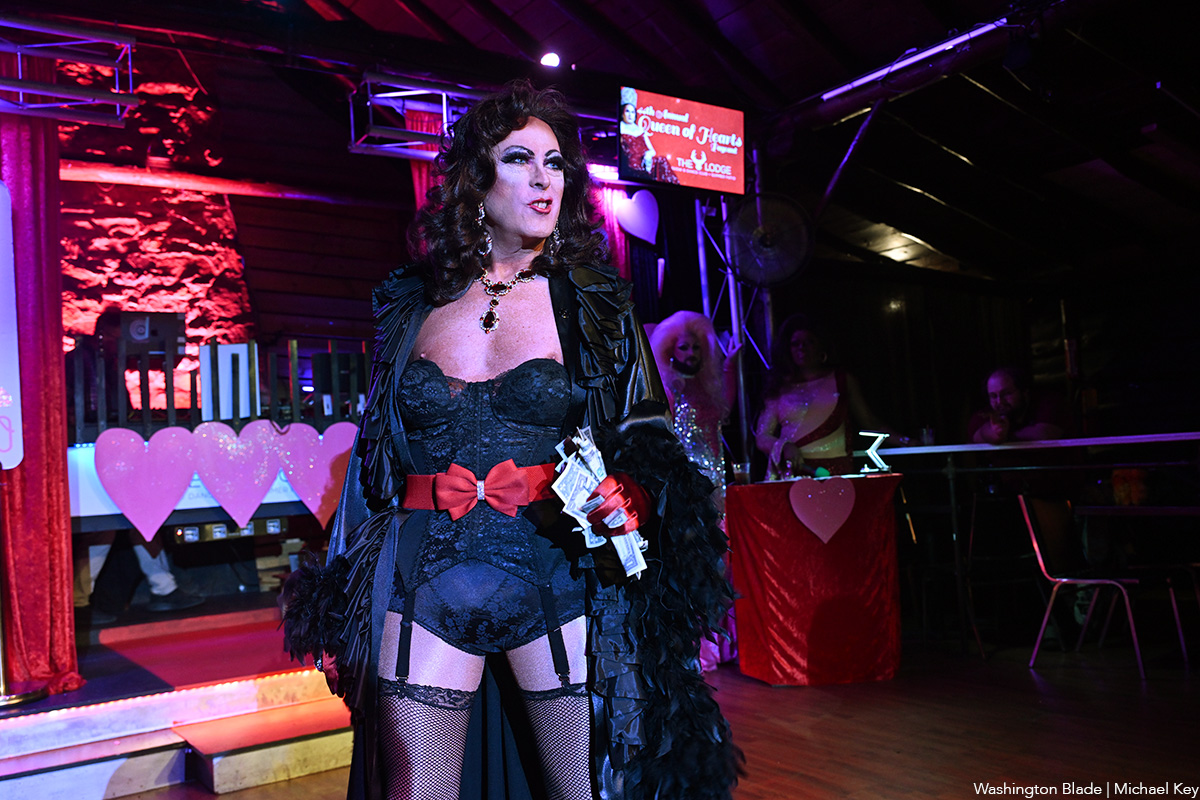
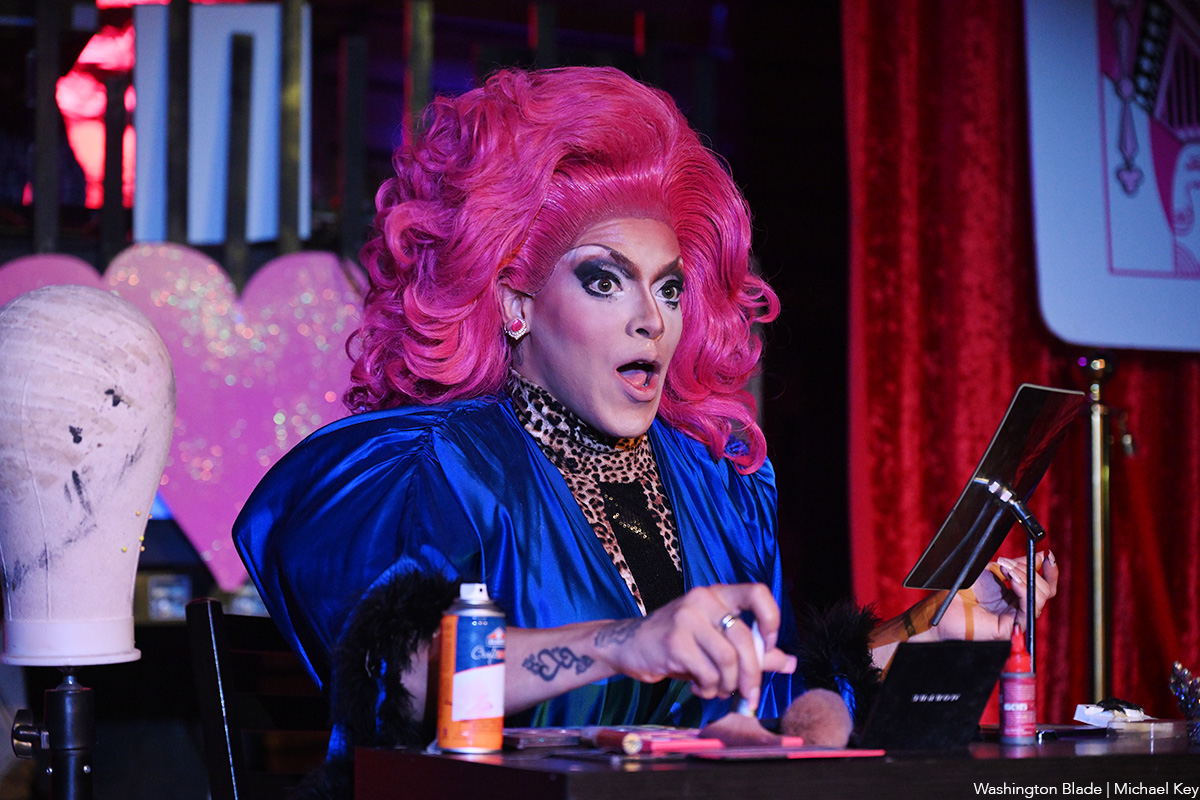
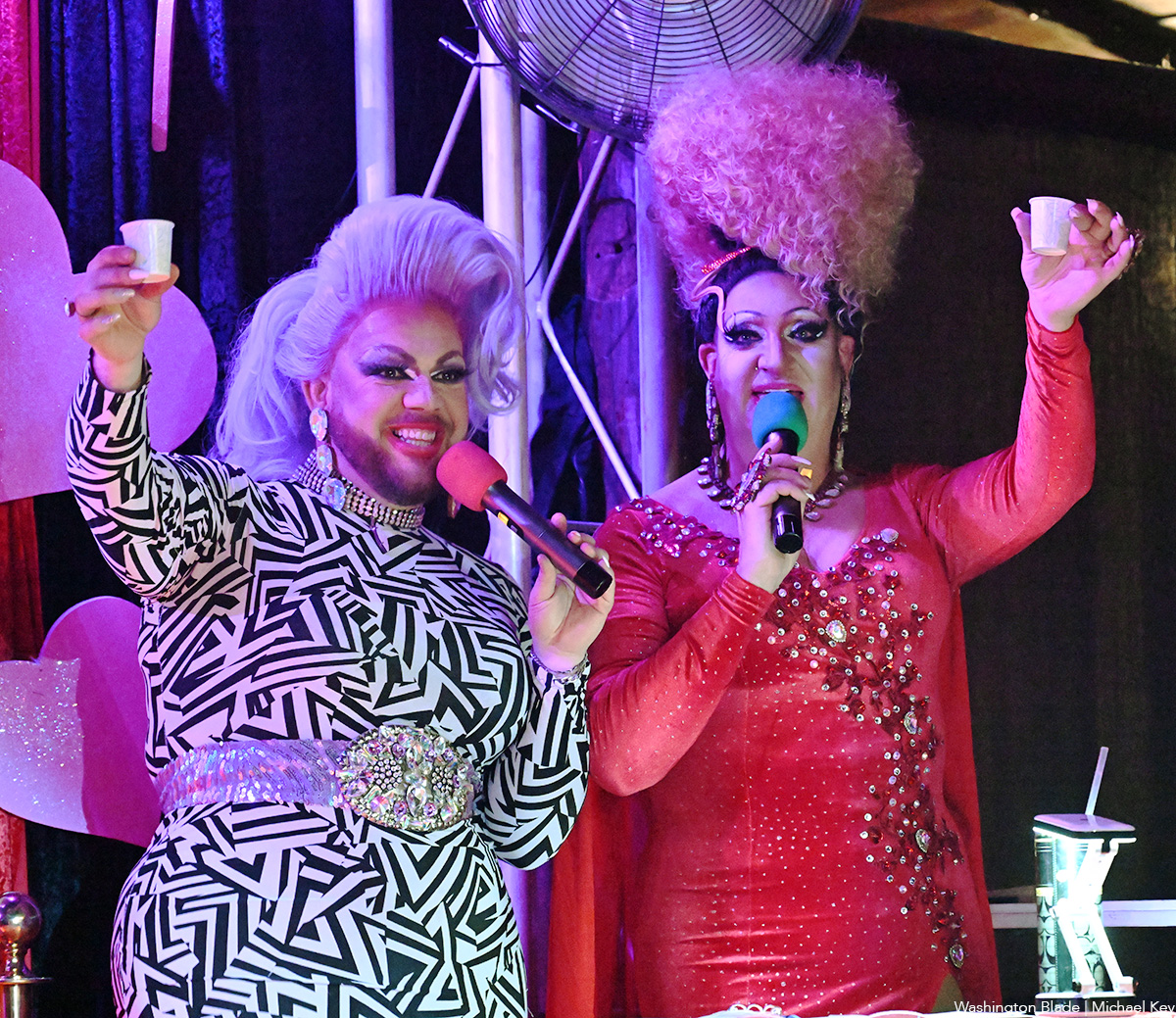


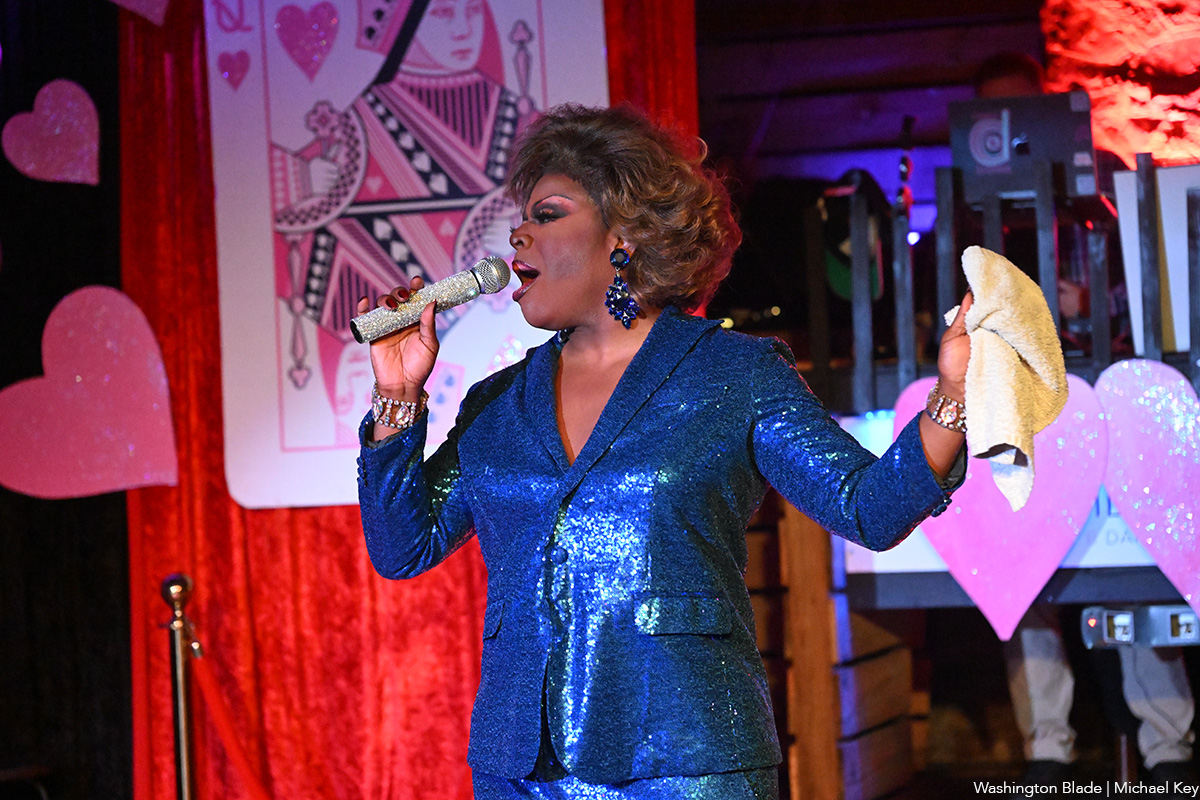
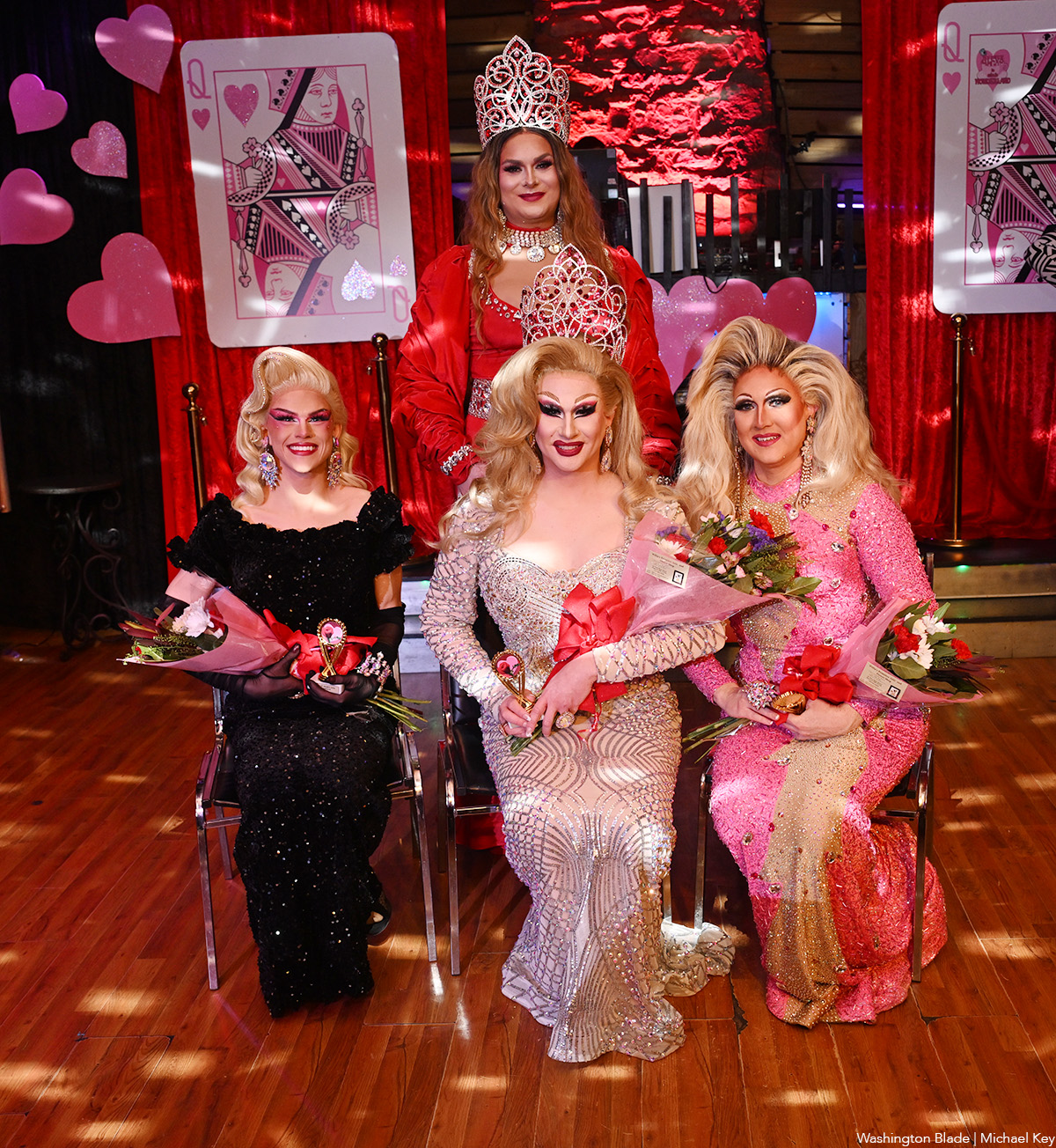
View on Threads
Books
New book profiles LGBTQ Ukrainians, documents war experiences
Tuesday marks four years since Russia attacked Ukraine

Journalist J. Lester Feder’s new book profiles LGBTQ Ukrainians and their experiences during Russia’s war against their country.
Feder for “The Queer Face of War: Portraits and Stories from Ukraine” interviewed and photographed LGBTQ Ukrainians in Kyiv, the country’s capital, and in other cities. They include Olena Hloba, the co-founder of Tergo, a support group for parents and friends of LGBTQ Ukrainians, who fled her home in the Kyiv suburb of Bucha shortly after Russia launched its war on Feb. 24, 2022.
Russian soldiers killed civilians as they withdrew from Bucha. Videos and photographs that emerged from the Kyiv suburb showed dead bodies with their hands tied behind their back and other signs of torture.

Olena Shevchenko, chair of Insight, a Ukrainian LGBTQ rights group, wrote the book’s forward.

The book also profiles Viktor Pylypenko, a gay man who the Ukrainian military assigned to the 72nd Mechanized Black Cossack Brigade after the war began. Feder writes Pylypenko’s unit “was deployed to some of the fiercest and most important battles of the war.”
“The brigade was pivotal to beating Russian forces back from Kyiv in their initial attempt to take the capital, helping them liberate territory near Kharkiv and defending the front lines in Donbas,” wrote Feder.
Pylypenko spent two years fighting “on Ukraine’s most dangerous battlefields, serving primarily as a medic.”
“At times he felt he was living in a horror movie, watching tank shells tear his fellow soldiers apart before his eyes,” wrote Feder. “He held many men as they took their final breaths. Of the roughly one hundred who entered the unit with him, only six remained when he was discharged in 2024. He didn’t leave by choice: he went home to take care of his father, who had suffered a stroke.”
Feder notes one of Pylypenko’s former commanders attacked him online when he came out. Pylypenko said another commander defended him.
Feder also profiled Diana and Oleksii Polukhin, two residents of Kherson, a port city in southern Ukraine that is near the mouth of the Dnieper River.
Ukrainian forces regained control of Kherson in November 2022, nine months after Russia occupied it.
Diana, a cigarette vender, and Polukhin told Feder that Russian forces demanded they disclose the names of other LGBTQ Ukrainians in Kherson. Russian forces also tortured Diana and Polukhin while in their custody.
Polukhim is the first LGBTQ victim of Russian persecution to report their case to Ukrainian prosecutors.

Feder, who is of Ukrainian descent, first visited Ukraine in 2013 when he wrote for BuzzFeed.
He was Outright International’s Senior Fellow for Emergency Research from 2021-2023. Feder last traveled to Ukraine in December 2024.
Feder spoke about his book at Politics and Prose at the Wharf in Southwest D.C. on Feb. 6. The Washington Blade spoke with Feder on Feb. 20.
Feder told the Blade he began to work on the book when he was at Outright International and working with humanitarian groups on how to better serve LGBTQ Ukrainians. Feder said military service requirements, a lack of access to hormone therapy and documents that accurately reflect a person’s gender identity and LGBTQ-friendly shelters are among the myriad challenges that LGBTQ Ukrainians have faced since the war began.
“All of these were components of a queer experience of war that was not well documented, and we had never seen in one place, especially with photos,” he told the Blade. “I felt really called to do that, not only because of what was happening in Ukraine, but also as a way to bring to the surface issues that we’d had seen in Iraq and Syria and Afghanistan.”

Feder also spoke with the Blade about the war’s geopolitical implications.
Russian President Vladimir Putin in 2013 signed a law that bans the “promotion of homosexuality” to minors.
The 2014 Winter Olympics took place in Sochi, a Russian resort city on the Black Sea. Russia annexed Crimea from Ukraine a few weeks after the games ended.
Russia’s anti-LGBTQ crackdown has continued over the last decade.
The Russian Supreme Court in 2023 ruled the “international LGBT movement” is an extremist organization and banned it. The Russian Justice Ministry last month designated ILGA World, a global LGBTQ and intersex rights group, as an “undesirable” organization.
Ukraine, meanwhile, has sought to align itself with Europe.
Ukrainian President Volodymyr Zelenskyy after a 2021 meeting with then-President Joe Biden at the White House said his country would continue to fight discrimination based on sexual orientation and gender identity. (Zelenskyy’s relationship with the U.S. has grown more tense since the Trump-Vance administration took office.) Zelenskyy in 2022 publicly backed civil partnerships for same-sex couples.
Then-Ukrainian Ambassador to the U.S. Oksana Markarova in 2023 applauded Kyiv Pride and other LGBTQ and intersex rights groups in her country when she spoke at a photo exhibit at Ukraine House in D.C. that highlighted LGBTQ and intersex soldiers. Then-Kyiv Pride Executive Director Lenny Emson, who Feder profiles in his book, was among those who attended the event.
“Thank you for everything you do in Kyiv, and thank you for everything that you do in order to fight the discrimination that still is somewhere in Ukraine,” said Markarova. “Not everything is perfect yet, but you know, I think we are moving in the right direction. And we together will not only fight the external enemy, but also will see equality.”
Feder in response to the Blade’s question about why he decided to write his book said he “didn’t feel” the “significance of Russia’s war against Ukraine” for LGBTQ people around the world “was fully understood.”
“This was an opportunity to tell that big story,” he said.
“The crackdown on LGBT rights inside Russia was essentially a laboratory for a strategy of attacking democratic values by attacking queer rights and it was one as Ukraine was getting closet to Europe back in 2013, 2014,” he added. “It was a strategy they were using as part of their foreign policy, and it was one they were using not only in Ukraine over the past decade, but around the world.”
Feder said Republicans are using “that same strategy to attack queer people, to attack democracy itself.”
“I felt like it was important that Americans understand that history,” he said.

More than a dozen LGBTQ athletes won medals at the Milan Cortina Winter Olympics that ended on Sunday.
Cayla Barnes, Hilary Knight, and Alex Carpenter are LGBTQ members of the U.S. women’s hockey team that won a gold medal after they defeated Canada in overtime. Knight the day before the Feb. 19 match proposed to her girlfriend, Brittany Bowe, an Olympic speed skater.
French ice dancer Guillaume Cizeron, who is gay, and his partner Laurence Fournier Beaudry won gold. American alpine skier Breezy Johnson, who is bisexual, won gold in the women’s downhill. Amber Glenn, who identifies as bisexual and pansexual, was part of the American figure skating team that won gold in the team event.
Swiss freestyle skier Mathilde Gremaud, who is in a relationship with Vali Höll, an Austrian mountain biker, won gold in women’s freeski slopestyle.
Bruce Mouat, who is the captain of the British curling team that won a silver medal, is gay. Six members of the Canadian women’s hockey team — Emily Clark, Erin Ambrose, Emerance Maschmeyer, Brianne Jenner, Laura Stacey, and Marie-Philip Poulin — that won silver are LGBTQ.
Swedish freestyle skier Sandra Naeslund, who is a lesbian, won a bronze medal in ski cross.
Belgian speed skater Tineke den Dulk, who is bisexual, was part of her country’s mixed 2000-meter relay that won bronze. Canadian ice dancer Paul Poirier, who is gay, and his partner, Piper Gilles, won bronze.
Laura Zimmermann, who is queer, is a member of the Swiss women’s hockey team that won bronze when they defeated Sweden.
Outsports.com notes all of the LGBTQ Olympians who competed at the games and who medaled.




















